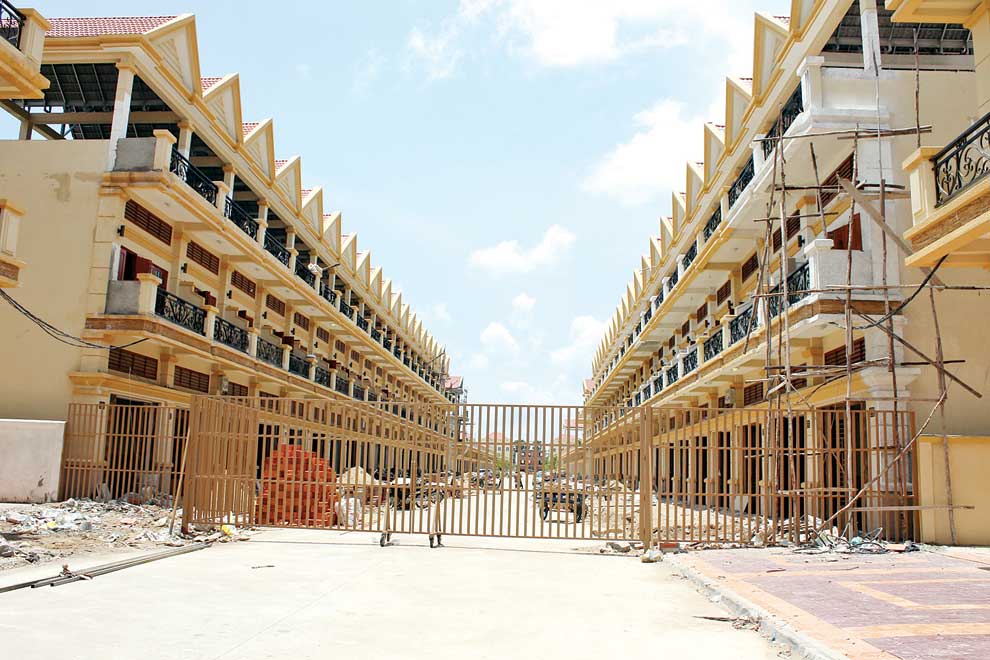
One of the many boreys that are under construction in Phnom Penh’s outer districts. POST STAFF
The Cambodian Valuers and Estate Agents Association (CVEA) and the Housing Development Association of Cambodia (HDAC) have voiced concerns over the largely unknown fact that some borey developers are dishing out loans and mortgages to their own clients.
Recently, boreys Peng Huoth, New World, Orkide, Phnom Penh Thmey and others, including a few condos, have devised and provided long-term mortgage plans which require owners to commit to a 30-year loan tenure without any deposit.
This is a new marketing strategy that some experts are worried about because of the long-term payment period which has the ability to double or triple the original price of the house.
Such a trend proves to be potentially risky business for the already fluctuating property industry as the ministry has yet to roll out adequate laws or regulations that prevent loopholes of this sort to occur.
CVEA president Kim Heang told Post Property recently that borey developers – in addition to building, marketing, and selling their units – are also providing mortgage schemes of their own, bypassing the responsibility of banks.
Furthermore, these developers also import raw materials for construction themselves. According to Heang, operating this way would mean that they do not have any support should their business fail.
“The practice in which borey developers are giving out mortgages actually increases the risk for customers. If one of the house-owners becomes unemployed, or loses their income, they will not be able to afford their house, and it will be confiscated,” he explained.
He said, “This trend will become a social cancer if left unmanaged; the ministry should seriously consider this issue.”
Huy Vanna, secretary of HDAC, said the trend of customers paying a long-term mortgage without any legitimate deposit increases their personal financial risk. If they are not able to earn more than $1,000 a month, a long-term payment scheme will fall short.
He raised questions that homeowners partaking in these illegitimate financial schemes should be more mindful of a number of things such as, “Are you paying for the interest only or the whole debt in a 30-year mortgage? Does the original amount stay the same, while you only pay for the interest or what?”
Vanna continued that based on his observation, while it is not necessarily fraud against customers, it is essentially a risk.
“The longer the payment is, the bigger the interest,” he said, adding, “If we think briefly about it, it’s not a problem at all. However, once the homeowner is unable to pay the mortgage because of whatever reason, will their house then be confiscated by the borey developer?”
Nevertheless, Nget Piseth, secretary to Borey New World’s CEO, defended their service, claiming that many middle and high-income people had already bought their own houses outright, many for investment purposes.
The less wealthy ones, however, are often not affluent enough to fork out a down payment. To solve this issue, New World came up with its own long-term mortgage plan without interest.
Piseth continued, “This mortgage plan is not a risk to live-in tenants. It’s more of a risk to the borey owners because they will have to get millions of dollars to construct the houses.”
“Live-in tenants only have to pay $6,000 a year. The developers must have enough money for the construction which is the main risk.”
Asked if they would confiscate houses from their customers if they did not pay due to job or income loss, Piseth said the borey developers would not go to such lengths. Instead, the company would use alternative methods such as getting the customer to sell their house as quickly as possible to cover the loss of costs.
Vongsey Vissoth, secretary of state of Ministry of Economy and Finance, echoed the concerns of the real estate industry experts.
As such, the ministry has decided to encourage the department of Industrial Finance as well as the National Bank of Cambodia to conduct extensive research and come up with regulations on this risky issue.
He continued, “This sector is a two-faced sword. If we can manage it well, it will be a driving force for the economy. However, if left untended, it will destroy the nation’s economy.”
When asked what policy or any standard of governance the ministry should create, Vissoth declined to comment.
Contact PhnomPenh Post for full article
Post Media Co LtdThe Elements Condominium, Level 7
Hun Sen Boulevard
Phum Tuol Roka III
Sangkat Chak Angre Krom, Khan Meanchey
12353 Phnom Penh
Cambodia
Telegram: 092 555 741
Email: [email protected]








